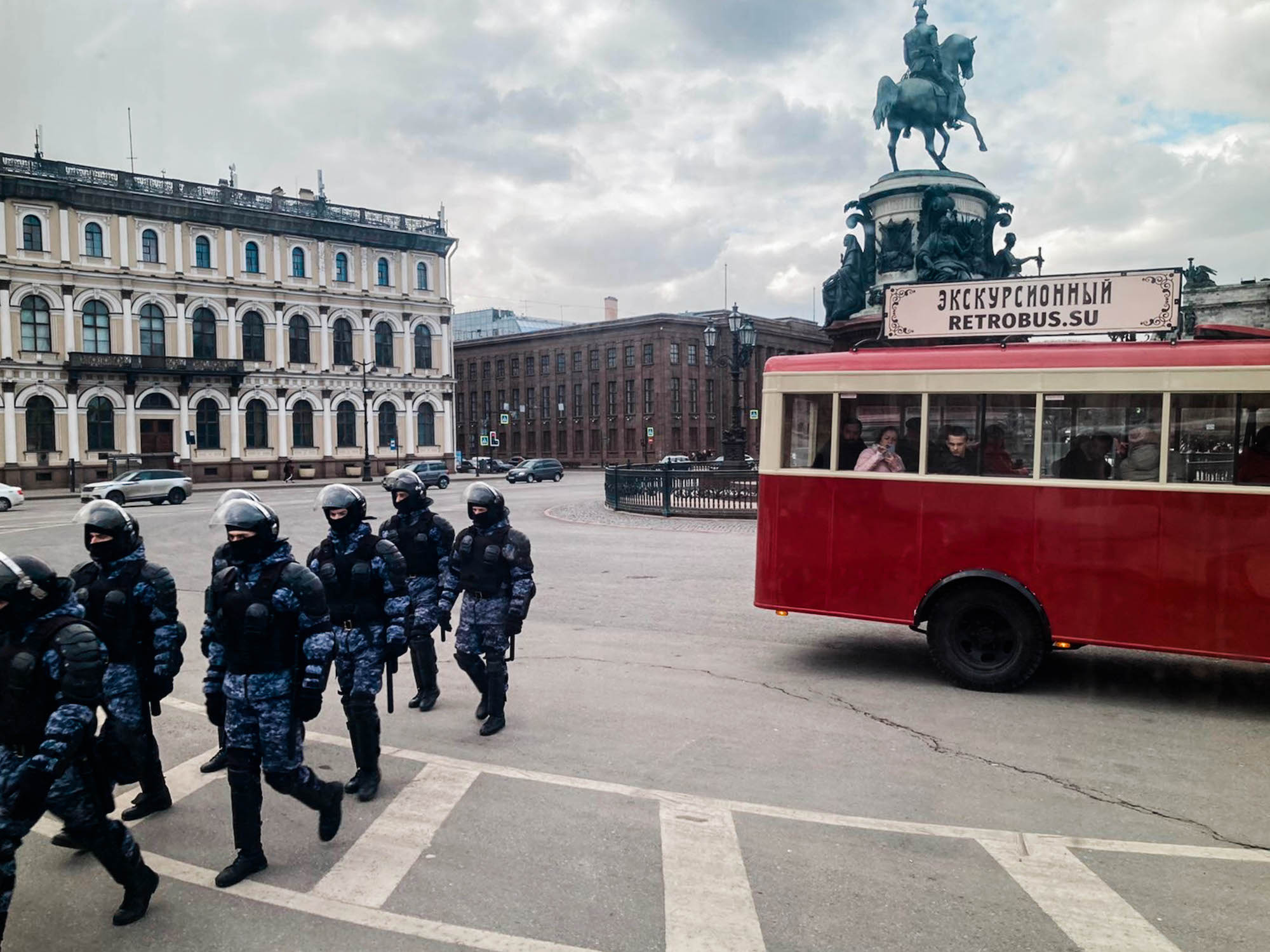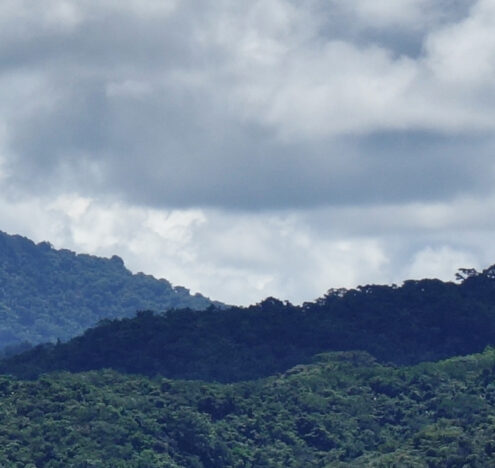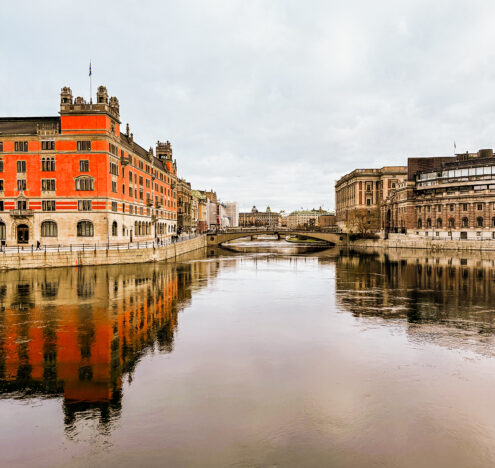On a cloudy St. Petersburg day in early April, Anna put on her green coat and left her apartment to attend a protest — something she’d done many times since moving to the city in 2015. She didn’t know that this one would likely be her last.
On her way, she passed open cafes and walked down calm streets. In Vladimir Putin’s Russia, there are few immediate signs of the war that rages less than a hundred miles away in neighboring Ukraine.
Together with her boyfriend, Anna, whose name has been changed for this story to protect her identity, joined a small crowd gathered to protest Russia’s ongoing invasion.
“What’s typical of Russian protests is that you come to the place… then you run from the police, and then you return to the place, and then you run [away] from the police,” she told me, laughing.
A video of the protest Anna’s friend found on Telegram shows her doing exactly that. In the video, nine police officers wearing helmets rush towards the crowd and Anna and her boyfriend dart away from them. The protest wasn’t large, she estimates about 50 people total — but even so, the police moved aggressively to disperse the demonstration.
POLICE BRUTALITY
In her seven years going to protests in St. Petersburg, Anna had witnessed police brutality, including law enforcement using tasers on protestors.
“St. Petersburg has the cruelest police in all of Russia. I understand it’s subjective, but I really feel so,” she said. For the most part, she had emerged unscathed — but her luck was about to run out.
“I had no idea we were being lied to,” she said. “I remember thinking: ‘why can’t the international community [watch] the Russian news to understand what happens actually?’”
At one point during the protest, she and her boyfriend ran in two separate directions, fleeing the police. Suddenly, a police car stopped right in front of her. A policeman jumped out, grabbed her, and put her in the car.
From the car, she was transferred to a special bus used to hold protestors before they are transferred to the police station. For an hour and a half, she waited in the bus with about 20 other protestors who had also been arrested. One good thing about being arrested at a protest is that this is a way to connect with like-minded people
“I say that if you want to meet someone good in Russia you should go to a protest and this bus, all good people are there,” Anna said.
A photo taken on the bus shows a group of smiling young people, some popping peace signs for the camera — in the background, two policemen look on.
Before reaching the station, the cohort contacted Apologia, a well-known human rights organization, and sent their names, phone numbers and the name of the police station where they were headed. At the station, lawyers from the human rights organization arrived to advise them on how to fill out their paperwork. Anna’s phone was confiscated and she awaited processing.
Her charge, which the court would hear in the morning, was not for protesting, but for breaking COVID safety rules. The regime has selectively enforced COVID rules to crack down on protests before. Officials accuse dissidents of exposing the public to COVID even as Putin gathers tens of thousands of people to rally Russians around the war in Ukraine and businesses and schools remain open.
But before her case would be heard, Anna and the younger members of her cohort were informed they would spend the night in jail.
There were three “cages,” Anna recalled — holding cells — for the group of six boys and six girls that were required to stay the night. The cells were bare except for two wooden benches. Anna’s boyfriend brought her blankets, food, and socks, which she shared with the other girls in her cell.
“It was really dirty, it smelled bad. [But I] was very lucky because two other girls with whom I [shared] this cage room didn’t have anyone to bring them the stuff.”
CRACKING DOWN ON DISSENT
Since Russia invaded Ukraine on Feb. 24, the Russian government has moved to crack down on dissent. On March 4, Putin signed a law effectively criminalizing any public opposition to the war, either by private citizens or news outlets. Under the new decree, individuals can face 15 years of prison time for disseminating “fake news” about the war — that can include simply referring to the conflict as an invasion or war, which contradicts the Kremlin’s line that it is a “special operation.”
On Anna’s bus, there was an older woman in her 60s with the words “no to war” written on her back — a violation of the Kremlin’s “fake news” law.
“I’m not so brave as people who go with signs… I try not to be very loud, I [try] not to be very visible. I try not to go too close to the police, but I just wasn’t very lucky,” she said. It’s a common refrain during our interviews: that she’s not as brave as others who are willing to take greater risks, a tension between self preservation and the desire to speak out.
According to the group OVD-Info, a Russian human rights organization, Anna is one of over 15,000 unlucky Russians who have been detained in relation to anti-war actions since Russia’s invasion. OVD-Info, which keeps a tally of protestors, includes Anna’s name on the day she was arrested.
Russia’s crackdown on the media environment to shape public opinion is effective. Polling shows a majority of Russians support the war, at least passively, and accept Putin’s rationale for the invasion. The study found that Russians who most often consume state-controlled news, such as television, are much more likely to support the war compared to those who rely on more independent sources — 60% versus 45%.
At the police station, Anna and her companions came face to face with the effectiveness of that propaganda. While waiting to be processed, they attempted to engage with the policemen on duty, explaining their motivation for protest and asking him why he does what he does.
“One policeman said that Putin knows better. If Putin says that we should be detained, Putin has his reasons,” she recalled. They “treat us like we are stupid, like we don’t understand, like we’re paid by the west to go to protests. They don’t believe that we actually don’t want war.”
The next morning at the courthouse, Anna waited for over four hours for her hearing. Given that her charge was for breaking COVID rules — not violating Russia’s “fake news” law — she thought her chances of being sentenced to more jail time were slim.
But the person whose hearing was immediately before hers, one of the boys that had also been held overnight, was sentenced by the judge to another seven days in jail. “That was the moment I [became] terrified,” she remembered.
A ROULETTE
Even more terrifying, one of the lawyers from Apologia, the human rights organization, told her that her fate was entirely dependent on the mood of the judge – a “roulette.” All that mattered, the lawyer told her, was whether the judge liked her or not. Anna had decided that she would lie about why she had been arrested, claiming to the judge that she had merely been walking by the protest and had nothing to do with the anti-war action. She knew this was a stretch but would not be easy to disprove.
“I guess if I was braver I would say … that I was at the anti-war protest and I don’t want war in Ukraine and that’s why I was detained,” Anna said. “But I was afraid to say so.”
The judge, a middle-aged woman who seemed distracted and uninterested, asked her a number of times if she was sure she had nothing to do with the protest, and then slapped her with a 10,000 ruble ($125) fine and told her she could go.
She breathed an enormous sigh of relief. “I was so happy in this moment, I realized I am going home today.”
SILENCE
Her arrest is both a testament to the will of a few anti-war Russians to speak out and the success of the Kremlin’s campaign to silence them. Anna, for all her bravery, says she won’t attend protests in Russia anymore, unless she’s certain there will be a large turnout. For someone with so much revolutionary spirit, it’s a bitter pill to swallow.
“Now I see the protest potential in Russia, and I know there won’t be massive protests,” she said.
To her, it doesn’t seem worth it to put her safety and wellbeing on the line when the majority of Russians support the war or aren’t willing to resist. She’s especially angry with those who understand what is happening, do not support the war, and still do nothing.
“I don’t want to live in a country with them. I don’t want to build a country with them together… I want to be a part of another community,” she told me.
It’s complicated, too, because she was once like these people, accepting Putin’s propaganda as fact.
EFFECTIVE PROPAGANDA
When Russia invaded neighboring Georgia in 2008, Anna was 16 years old and still living in Kazakhstan – the former Soviet Republic where she was born. What she remembers from that year is sitting with her family watching Russian state news, which parroted Kremlin talking points about the war.
“I had no idea we were being lied to,” she said. “I remember thinking: ‘why can’t the international community [watch] the Russian news to understand what happens actually?’”
It wasn’t until she went to university in Novosibirsk, a city in southern Siberia, that she began to feel differently, or care about politics at all. It started with reading more news and doing personal research. In her first year there, she was also introduced to the Russian dissident and opposition leader Aleksei Navalny in a very college-appropriate way — through a crush on a classmate.
Scrolling through her crush’s Vkontakte, the Russian equivalent to Facebook, she noticed he was posting news about Navalny. She read the posts and thought they were interesting. The romance never went anywhere, but her interest in the opposition movement stuck.
POLITICAL AWAKENING
When she moved to St. Petersburg in 2015, Anna’s activism ramped up. Through her master’s program, she met young people who were well versed in politics and vocally opposed the regime. Together, they attended several protests.
It was “very easy to be a part of the protesting community because protest[s] back then were very massive. You felt.. that you are a part of a big community,” she remembered.
In 2017, she attended protests against government corruption, spurred by an investigation into then Prime Minister Dmitry Medvedev by Navalny’s Anti-Corruption Foundation. And in 2021, she joined mass demonstrations for three consecutive weekends after Navalny returned to Russia (after an attempt on his life by the Russian government) and was arrested.
The first weekend of protests in 2021 felt euphoric. She thought: “I am not alone. We can do anything.” The feeling didn’t last long. “By the end of the third protest I was so scared, because so many people were caught and the police were very cruel.”
Anna is fortunate that her immediate family also doesn’t support the war. That is in contrast to some of her friends, who she says have cut ties with their parents because of disagreements over the invasion — another casualty of the conflict.
There’s no question that when it comes to loss of life, home, and happy futures, Ukrainians are suffering much more than their Russian counterparts. An estimated five million refugees have fled Ukraine since February. Thousands have died or been injured thanks to Putin’s invasion. Cities and towns have been rendered unrecognizable by Russian shelling and airstrikes.
Anna, who describes the war as the worst thing that has ever happened in her life, is quick to point this out. The hardships she faces are nothing compared to the death and devastation that’s taking place in Ukraine, and to even think about her problems fills her with guilt, she said.
But the war has also robbed her of her future in Russia and her sense of belonging. Anna and her boyfriend have joined the over 200,000 Russians that have left the country since the start of the invasion, renting an apartment in Turkey. Their plans are to stay temporarily — she works remotely at a Russian company but can only live half the year outside of Russia — though she says if she was able to find a job abroad she would leave in a heartbeat.
“For me it’s a complex question to understand where is my home. I didn’t feel at home in Kazakhstan where I was born, and I have moved a lot in Russia and there was no place I stayed for a long time…I can easily find my place in another city, in another country,” she said.
But the hard part will be leaving her family. She doesn’t think that her mother will be able to find a job abroad because her English is poor and her grandmother is old. She would have to make a new home, somewhere else, without them.
Anna knows she’s lucky. Few opposition-minded Russians can boast such supportive parents.
The day after her arrest she published an Instagram post about her experience.
“My little revolutionary,” her mother wrote as a comment.
Eloise Goldsmith is a freelance writer based in Brooklyn, NY.





















